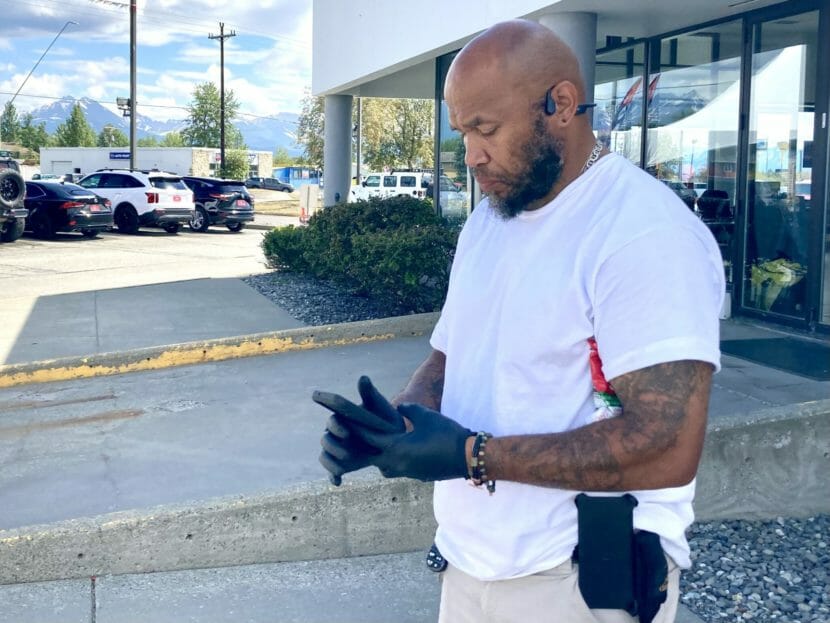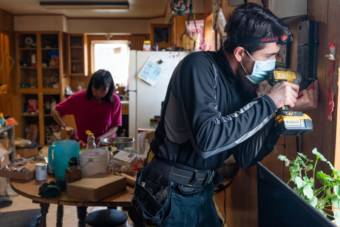
In his 26 years of being incarcerated, Sylvester Byrd Jr. never had access to the internet. “I went to prison in 1995, like, right as the internet started.” When he got out in 2021, Byrd said he felt like he had missed “the whole entire thing.”
Byrd was lucky to have a “phenomenal support network” when he got out of prison, but he said there are skills he wished he could’ve learned beforehand that would’ve made re-entering easier. Things like online banking, filing taxes online, paying bills online, how to look for a job, how to present yourself over Zoom and interview online, how to identify spam. The list goes on.
“How would you do so many day-to-day things that people take for granted out here because it’s readily available? You know, people grow up with a tablet in hand or a smartphone in hand,” Byrd said. “I don’t think anybody inside understands that a car can park itself now.”
The Alaska Department of Corrections doesn’t allow inmates to access the internet and state law prohibits prisoners to have a computer “of any kind” in their cell. There was a legislative effort this past session to change that — House Bill 118 sponsored by Sitka Democrat Rep. Jonathan Kreiss-Tomkins — but it failed to pass this session.
Still, the Department of Corrections is moving forward with planning to implement tablet use to supplement existing resources and teach inmates some of the skills on Byrd’s list.
“Our goal is to be able to allow them to take these computers or these tablets into their cells,” said Laura Brooks, director of health and rehabilitation services at the Department of Corrections. “Eventually we want to see this bill go through.”
By “tablet,” Brooks is not referring to the common understanding of what a tablet is, like an iPad or a Surface. Rather, she means tablets that are “designed for correctional use and they have a multi-layer security matrix that lets inmates access approved content without being able to access the internet.”
Computer access varies across state
Department of Corrections has 13 facilities around the state. Brooks said each is different when it comes to access to computers, which are preloaded with learning and typing programs, like Microsoft Office.
“Out at Goose Creek, we have probably several dozen computers in the education space. A facility like Ketchikan only has a handful. But we have that available to offenders of every facility,” Brooks said.
“Having tablet access would open up opportunities for a lot more of our inmate population,” she said.
Brooks recognizes there are inmates, like Byrd, who entered the corrections system before devices like smartphones became ubiquitous.
“Part of our focus on rehabilitation is making sure that they’re ready to reenter society, and ready to go to work, ready to apply for jobs online, ready to access Uber — things like that. And so trying to make sure that the resources that we have inside can simulate some of those things for when they get released is a big step towards rehabilitation,” Brooks said.
Other resources that could be made available include computer literacy, GED testing, substance abuse programming, mental health programming, meditation programs, guided learning on depression and anxiety and things like that.
The bill
Kreiss-Tomkins first introduced HB 118 in 2021. It would amend state law to allow prisoners to have and use a computer in their cells for purposes that facilitate their rehabilitation or compliance with a reentry or case plan, including access to legal reference materials, visitation, or health care.
It went through committee hearings in House State Affairs toward the end of the session in 2021. This year, the bill passed the House 31-1 in early February. When it went to the Senate, it got referred to the Senate State Affairs Committee and that’s where it remained for the rest of the regular session.
“There was time for it to pass out and there was one hearing, I think, in the last week of session, but it did not pass out,” Kreiss-Tomkins said.
Sen. Mike Shower, R-Wasilla, said a couple factors contributed to the bill not moving from his committee. They included what Shower described as a lack of a plan by Senate leaders on what bills were supposed to pass. He also said, “Some committee members that weren’t particularly happy” about the bill and still had questions.
Kreiss-Tomkins, who isn’t running for re-election, still wants to see the bill go through. “Something I will do through the course of this year is try to make sure that somebody picks up this bill to try to get it passed next year. I ultimately want to make sure it happens. And I tend to think it’s just a when, not an if.”
Brooks agrees and anticipates the bill, or a version of it, passing eventually.
Cost
Jonathan Pistotnik, coordinator for the Anchorage Reentry Coalition, supported HB 118, but is skeptical about the tablet concept.
“Those of us that were advocating for the bill on the reentry side, we were not talking about tablets, we were talking about computer access,” he said. The bill came with a zero fiscal note, which Pistotnik called “a red flag.”
“The Department of Corrections has found a no cost solution with tablets and I think there are going to be unintended fees and consequences that kind of go along with this. They’re going to pass on the cost to somebody and it’s probably going to be the incarcerated people who don’t have money to begin with, or their families who are already overburdened with, you know, keeping in contact with their loved ones,” Pistotnik said.
Access to tablets could be a positive change as long as there are no associated fees for incarcerated people, he said. They could provide a pathway for inmates to learn needed skills for reentering the community and staying out of prison.
“When somebody gets released, they still need a job, they still need a place to live, they still need food, they’ll still need their ID. And if they can’t get that stuff on the outside, then they’re still in that precarious situation. But if they build up that resiliency and that sort of foundation before they get released, I think it would improve the possibilities that they stay in the community and that they’re successful,” Pistotnik said.
Moving forward
Brooks isn’t sure, at this point, what the costs of implementing tablets are. “It depends on the vendor,” she said. “What I can tell you is, whatever cost there may be for the inmate or their family, there would be exceptions made for folks who are indigent, so they’re not going to be denied access to this if they have no money on their books.”
But, she said, Department of Corrections is moving forward with planning for tablet access. “We’re working on a policy now to determine who would and under what circumstances someone may not be able to access a tablet.”
She doesn’t envision a near future where an inmate is sitting in their cell participating in a college class over Zoom, but the department is considering different options. Even video visitation is “on the table,” she said.
“At this point, we’re focusing on supplementing the programs that we currently have, but if this bill were to go through and we were able to provide tablets, I think it would open up a whole lot of other doors. I think the possibilities are almost endless.”
Byrd, who reached “one year being free” in May, said he’d like to see access to technology in prison expand beyond preloaded tablets. “There are guys with no chance of getting out who are genuinely wanting to better themselves. There’s three guys that I know personally, very good friends of mine, who want to do college classes. However, the only way to do them, especially during COVID, was online.”
As far as the possibility of video visitation, Byrd would’ve liked to have had that when he was in prison. “I could have talked to my mom before she passed.”


